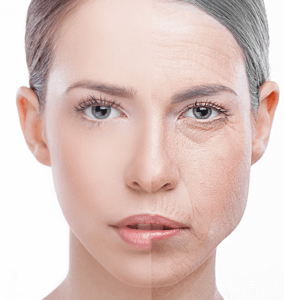A facelift, called Rhytidectomy, is a surgical procedure used in plastic and aesthetic facial surgery. The procedure can tighten the skin of the face and the connective tissue beneath and significantly improve facial laxity. The result is “smooth and tight skin”. Usually, a plastic surgeon with experience in facial cosmetic surgery will carry out this procedure whenever a patient is looking to appear younger.

Different Types of Facelifts
These are as follows:
Classical surgery in which an incision is given around the ear, the skin flap is raised, and the underlying subcutaneous tissue is called SMAS. Various techniques tighten it, and the skin is re-draped after trimming the excess skin.
A modified version of the facelift, the minor facelift, is designed to tighten loose skin around the neck and jawline. In this type, the incisions are usually limited and don’t extend behind the ear.
A mid-facelift focused on repairing the sagging skin that extends from the top of the cheeks to the eyes. It is also called a cheek lift. The face consists of the cheeks and the nose.
Facelifts with vampires, liquid facelifts, and thread lifts are a few examples of nonsurgical procedures that focus on the skin of the face. A nonsurgical facelift procedure does not require general anesthesia or extensive incisions. However, it addresses signs of aging like sagging skin and wrinkles.
How Does Facelift Surgery Work?

Things You Can Do to Prepare for Facelift Surgery?
Facelifts can be performed in a hospital or an outpatient surgical center.
Before the Procedure:
Some procedures are performed with sedation. A tiny area of the body may be dampened using a local anesthetic. You may experience a sleep-like state as a result of general anesthesia.
During the Process:
The facial fat and neck can be sculpted, removed, or moved. A facelift generally involves lifting the skin and tightening muscles and tissues. The facial skin is then draped over the new facial contours. Not trimmed skin is removed. The procedure’s incisions are determined by the method and preferences of the patient.
- An incision for a traditional facelift begins at your temples along the hairline. It extends down and around the top of your ears. A cut could be made below the chin.
- A smaller incision starts near the hairline close to the top of your ear. It is wrapped around the side of the ear but does not extend to the lower part of the scalp.
- The neck lift incision begins in the frontal lobe of your ear. It extends across the ear until it reaches the lower part of the scalp. A small cut is made below the chin.
A facelift usually lasts between 3 and 6 hours. However, it could be longer if other cosmetic procedures are performed simultaneously.
Benefits of Facelift:
There are a lot of benefits; some are as follows:
- Your new appearance will be much more appealing
- No more skin that is loose, which also makes it possible to eliminate fat deposits
- Everlasting effects
- Feeling better about yourself will make you feel more comfortable and improves the daily quality of your life.
Who is Eligible for the Treatment?
The natural aging process causes physical facial skin sagging with varying severity in everyone at various levels. The most apparent wrinkles and sagging appear on the lips, around the nose, under and beside the eyes, and under the neck’s chin.
The skin typically regenerates itself before the age of 40 to 45 years old, after which the sagging and wrinkles are evident. Anyone whose skin is degrading and appearing wrinkled and wishes to preserve or gain a younger appearance is suitable for facelifts.

Who is Not Eligible to Receive the Treatment?

Wrinkling and sagging of the skin are signs of aging, and those younger than 30 typically are not candidates for the procedure. Individuals suffering from specific mental or physical ailments are unsuitable for this procedure. Patients who smoke and suffer from hypertension are generally not qualified to undergo surgery. Patients who have an allergic reaction to anesthesia are also unsuitable for the procedure.
Life After Facelift
Facelifts are a complicated procedure that requires a high level of surgical expertise. However, the healing process is rapid for the majority of patients. After a facelift, patients usually return to their regular daily routines within two weeks (strenuous exercise may require waiting for about four weeks). These times are typically shorter following a mini facelift. Because every patient heals differently, the cosmetic surgeon you consult will provide specific instructions on caring for your skin and returning to your routine.
Results
A facelift can make your neck and face appear more youthful. If performed by a skilled, qualified, board-certified Cosmetic surgeon with board certification, the procedure can be created to give you natural results and be able to age naturally with the person you are. Although there is no way to stop the natural process of aging, after the procedure, you’ll appear years older than you would without the procedure.
A healthy, steady weight is essential because significant weight fluctuations can result in skin stretching out and then stretching out again. It is also crucial to follow an ongoing, high-quality routine for skin care to ensure your skin is healthy and free from premature aging. You can take a few actions to ensure your results look their best. If a licensed cosmetic surgeon performs it, Facelift surgery is a non-stressful procedure and an excellent method to improve your appearance. The best way to determine whether facelift surgery suits your needs is to speak with a board-certified cosmetic surgeon.
